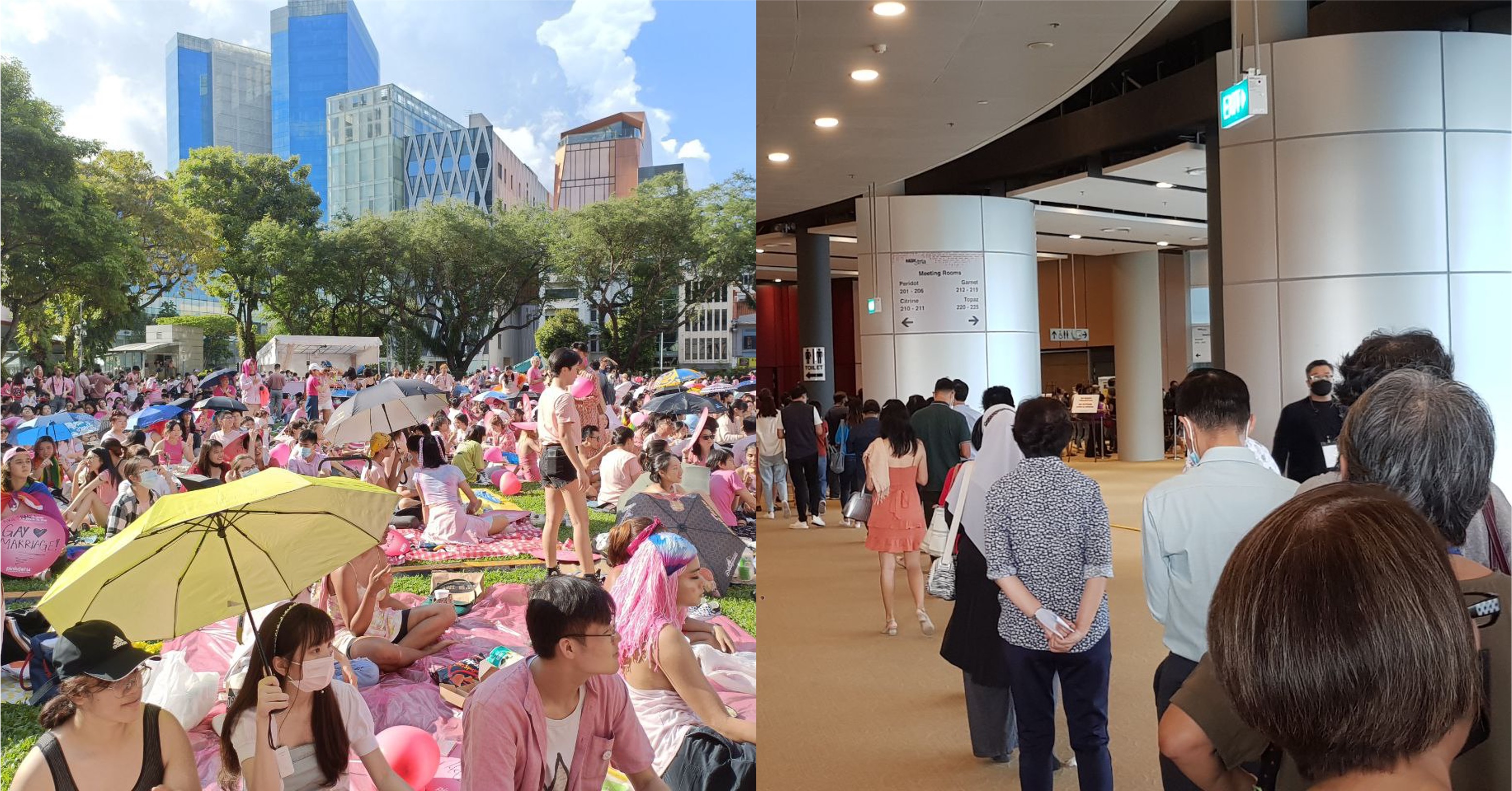Follow us on Telegram for the latest updates: https://t.me/mothershipsg
Deputy Prime Minister Lawrence Wong addressed the issue of the section 377A of the penal code, which criminalises sex between men, and its impact on Singapore society in an interview with Bloomberg's editor-in-chief John Micklethwait.
Wong did not provide new details in terms of the government's position on the ongoing discussion, but emphasised that it is a divisive issue that is for Singaporeans to work out among ourselves, and acknowledged deeply-held, opposing views by different segments of society.
Foreign companies based in Singapore facing labour shortages
Micklethwait initially asked Wong, who is also the Finance Minister, about "continual complaints" from foreign companies about their problems with hiring people, citing the laws restricting the number of foreign workers.
After Wong elaborated on the global labour crunch, and the fact that Singapore has lifted Covid restrictions yet companies still cannot get workers from their previous sources, Micklethwait followed up with a question about 377A.
"Another issue with foreign companies. Nancy Pelosi did bring up Singapore's section 377A which is the one which criminalises sex between men. When is that rule going to go?"
He was referring to U.S. Speaker of the House Nancy Pelosi's recent visit to Singapore. In a statement, Pelosi mentioned asking the local business community for their support for the LGBTQ community here, as more American businesses establish themselves and add offices in Singapore.
In response, the Ministry of Home Affairs (MHA) issued a reminder to foreign businesses in Singapore that divisive issues are for Singaporeans themselves to discuss and reach a consensus.
377A is something for Singaporeans to decide: Lawrence Wong
In response to Micklethwait, Wong echoed MHA's statement, and said that the 377A question is something for Singapore and Singaporeans to decide.
"It is one of those issues that is has to be managed and dealt with carefully and sensitively, because it pertains to our social values and norms and we have been doing this for a range of different issues," Wong added, and said that issues like sexuality, race and religion are issues where different segments of society hold "deep" and sometimes "opposing" views.
The process to deal with this, Wong explained, is to engage the different groups and see if a common understanding and mutual accommodation can be reached in order to avoid deeper polarisations in society.
Law viewed as a 'marker' by certain segments of society
Micklethwait made a personal reference, and said that as a "modern", "cosmopolitan" man who has studied abroad, including at Harvard in the U.S., it must be "very embarrassing" to have a law like 377A when Singapore is trying to attract talent.
Wong pointed out that the law is not something introduced by the government of Singapore, but rather, a holdover from British colonial times.
He acknowledged that many former British colonies with this "legacy" have repealed similar laws, but he said that many segments of society in Singapore who view it as a "marker" for other things, like societal values, family and marriage.
"Micklethwait: So, it would be fair to put that into another way, you personally seem in favour of the law or you think you need to bring Singapore in to do it?
Wong: We will explain all that in due course. As I said just now, it is a live issue for us because we are in the midst of discussing and engaging different parties on this."
Foreign workers with same-sex spouses face visa problems
Micklethwait also highlighted the challenge faced by foreign companies about hiring someone with a same-sex spouse, as they may face troubles getting a visa for their spouse as their marriage is not recognised under the same visa. He added that is one area where Hong Kong is more progressive than Singapore.
In response, Wong said he is aware of such feedback, and the government has been able to deal with that on a "case-by-case" basis. But he maintained that the "broader issue" is not 377A per se, but how society is organised and concerns among some segments of society whether values will change, and that's why engagement with different segments of society is important.
Any evidence that most Singaporeans are against 377A repeal?
Micklethwait asked: "Do you have any evidence that the most Singaporeans are against getting rid of the law or is it or is it just a substantial minority is against?"
Wong responded:
"As I have highlighted, the two issues – the law is one matter. Views on the law and criminalisation of homosexual behaviour certainly has evolved, has changed, but there are also views around family and marriage, which is different from the first matter, which I have highlighted.
People do feel strongly about the latter, on family values and marriage. And as I mentioned just now, we will have to engage them and consider how best to move forward on this matter, recognising that people in Singapore hold very strong views, and sometimes these are opposing views."
Top image by Mothership.
If you like what you read, follow us on Facebook, Instagram, Twitter and Telegram to get the latest updates.
